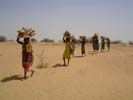
“Violence against Darfuri women is not a women’s issue, it is an issue of accountability and justice,” proclaimed John Bradshaw, the Washington director of Physicians for Human Rights at a briefing filled with Congressional staffers and NGO representatives. PHR held a panel on Capitol Hill on Wednesday, with support from Enough and other partners, to highlight a situation that is far from over: violence against Darfuri women.
In 2008, PHR conducted extensive research in Farchana, a refugee camp in Chad, not far from the Sudanese border, that houses 20,000 refugees from Darfur. The conclusion of their recent report was clear: the atrocities committed against women continue, rape is a common occurrence, and physical, emotional, and social hardships endure long after the attack. PHR’s interviews revealed that a quarter of the women living in the camps have been raped, most commonly when they left the camps to collect firewood or graze their livestock.
Across the panel, the speakers spoke of rape as a tactic of war and a strategic method used to destroy communities and demoralize individuals. It affects both the women and the men who struggle with the stigma afterward.
According to Susannah Sirkin of PHR, women in the camps never feel safe and regularly risk their lives to feed their family. Leaving the camp to collect wood is a constant stress, with men lurking outside the camps, waiting to take advantage.
When Sirkin asked one woman what she would like from the international community, she said, “Tell the world that life in the camps is not good. Bring us back to the camps in Darfur and if you cannot, then take us from the camps in Chad. Anywhere else is better than here.” But the conditions in Darfuri camps are not much better than those in Chad. Dr. Mohammed Ahmed, a Sudanese doctor who works with rape victims in several Darfuri refugee camps, claimed that last month alone, he treated 13 girls who had been brutally raped. Some of the girls did not survive the abuse.
The momentum to tackle the issue of violence against women is growing in both the Congress and the State Department. Leaders increasingly acknowledge the importance of figuring violence prevention integrally into all of the United States’ foreign policy goals – and not just as a peripheral issue.
There are fewer news reports about the challenges Darfuris face, but as the PHR report and briefing soberly remind us, we must not assume that the problems therefore have gone away.
Photo: Darfuri women collect firewood. (Courtesy of Doug Mercado)

